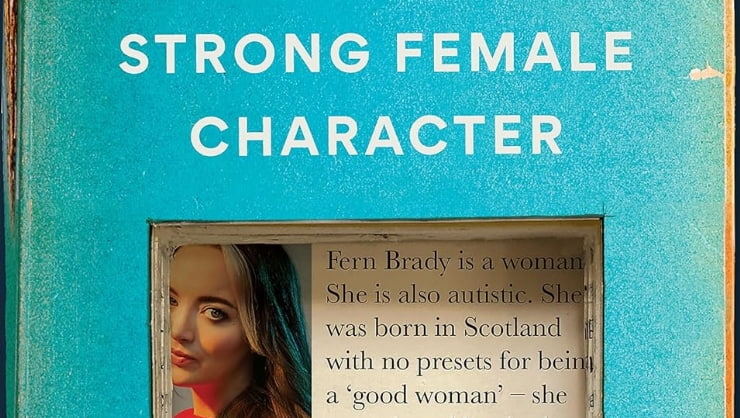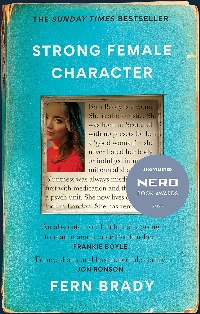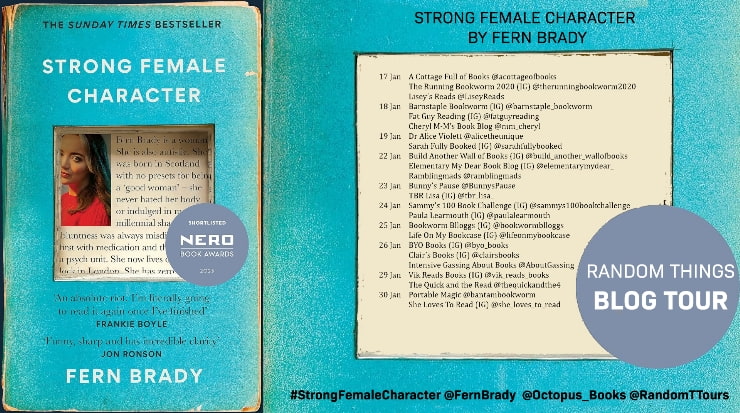Blog tour: Strong Female Character by Fern Brady

This post is part of a blog tour organised by Random Things Blog Tours. I received a free copy of the book in return for an honest review.
‘A summary of my book:
‘1. I’m diagnosed with autism 20 years after telling a doctor I had it.
‘2. My terrible Catholic childhood: I hate my parents etc.
‘3. My friendship with an elderly man who runs the corner shop and is definitely not trying to groom me.
‘4. Homelessness.
‘5. Stripping.
‘6. More stripping but with more nervous breakdowns.
‘7. I hate everyone at uni and live with a psycho etc.
‘8. REDACTED as too spicy.
‘9. After everyone tells me I don’t look autistic, I try to cure my autism and get addicted to Xanax.
‘10. REDACTED as too embarrassing.’

Comedian Fern Brady is autistic, but wasn’t diagnosed until her early thirties. Her memoir, Strong Female Character, takes us through her childhood and young adulthood, during which she was continually misunderstood, mistreated, and misdiagnosed.
We follow Fern as she struggles to interpret the social world around her, has meltdowns without knowing what they are or why they’re happening, and gets into increasingly dangerous situations, before it’s finally confirmed that she was never “bad” or being awkward on purpose, and she has to adjust to her new knowledge about herself.
Strong Female Character takes you on an emotional rollercoaster, and should be required reading for anyone who wants (or needs) to understand autism better.
While Fern often made me snort by poking fun at the people and systems she found/continues to find frustrating and nonsensical, she also tells shocking stories about being repeatedly corporally punished and thrown out by her parents, receiving laughable “help” when she was in severe distress, and being in a toxic relationship with a man who nearly killed her.
More than anything else, this book reignited my anger about the injustice and damage done to the Lost Girls — undiagnosed autistic girls who flew under the radar because they performed well academically, blended in by imitating their peers, and didn’t fit the “badly-behaved young boy obsessed with trains” stereotype, but actually really needed attention, understanding, and support.
As I grew up around the same time that Fern did, and it absolutely wouldn’t surprise me if someone told me I was autistic (I’ve read a lot on the subject, and relate to a lot of autistic content I see online), I could identify with quite a few of her experiences.
These included not knowing how to approach people and make friends in nursery; always saying the wrong thing, or coming across as a know-it-all, in school; getting agitated when people make too much noise, or move my things; listening to music as an unofficial reasonable adjustment in noisy environments; and more besides.
As an early-2000s depressed and anxious teenager, I could totally recognise Fern’s experience of symptoms being waved away and/or swept under the carpet, and piecemeal “treatment” of little-to-no therapeutic benefit.
However, as Dr Stephen Shore says, ‘if you’ve met one person with autism, you’ve met one person with autism’, and a number of Fern’s experiences don’t align with mine, but I can very much see her traits across a number of my friends (funny how so many of the best friends I’ve had since I was about nine are now diagnosed/suspected of being autistic…).
For example, Fern’s reactions to being overstimulated and overloaded are loud and outwardly explosive, and I have friends who are the same.
It could be my baked-in personality, it could be my very different environment growing up, it could be because my reaction to finding I always said the wrong thing was ‘can’t say the wrong thing if I never talk, can’t get bullied if most people forget I’m even here’, but I tend to implode, rather than explode.
This is great if you want to blend in and avoid causing a scene or making anyone uncomfortable, but not so good if you’re trying to convince a medical professional of your genuine distress (and why I don’t rate my chances of being referred for/receiving a diagnosis). Not dissimilarly, Fern nonplusses several mental health workers by recounting a distressing incident in a flat, matter-of-fact tone.
A note of warning I would give anyone reading this book (other than a trigger warning for, well, everything) is that Fern can be a tad fatphobic and ableist in her descriptions of herself and other people.
However, while Fern describes herself as a rigid, black-and-white thinker, her writing suggests she has more capacity for fluidity and nuance than she gives herself credit for.
She lays bare her parents’ reprehensible behaviour, but concedes they did do some things right, and still has a relationship with them; she paints an unflattering picture of the girls she went to school with, yet notes they weren’t given many options in life; her initial reaction to her autism diagnosis is to distance herself from the common image of an autistic person, but she comes to challenge her internalised ableism and find comfort and community in autistic spaces online.
Strong Female Character is by turns entertaining, brutal, and highly recognisable.
